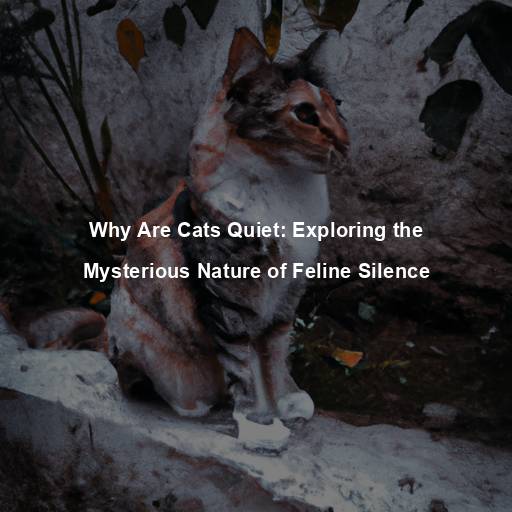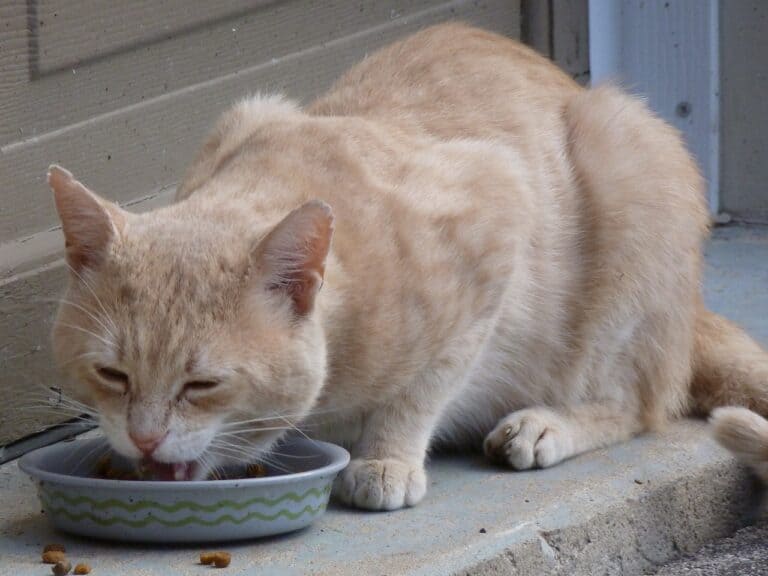Why Are Cats Quiet: Exploring the Mysterious Nature of Feline Silence
Last Updated on August 6, 2023 by Evan
Contents [hide]
- 1 The Fascinating World of Cats
- 2 The Nature of a Cat’s Personality
- 3 The Benefits of a Quiet Cat
- 4 The Enigma of Feline Silence
- 5 Decoding the Language of Cats
- 6 The Mystery of the Purr
- 7 The Benefits of Cat’s Quiet Demeanor
- 8 Embracing the Quiet Elegance of Cats
- 9 FAQs – Why are cats quiet?
- 9.1 Why are cats generally quiet animals?
- 9.2 Do all cats have a similar level of quietness?
- 9.3 Are some cat breeds quieter than others?
- 9.4 Do cats have the ability to be noisy if they want to?
- 9.5 Can a quiet cat become more vocal?
- 9.6 Are there any benefits to having a quiet cat?
- 9.7 How can I encourage my cat to be quiet?
The Fascinating World of Cats
Cats have long captivated our hearts with their enigmatic personalities and graceful presence. From their mesmerizing gaze to their luxurious fur, there is something undeniably captivating about these mysterious creatures. One peculiar characteristic that sets cats apart from many other animals is their innate ability to be astoundingly quiet. Unlike dogs, who are known for their boisterous barking, cats prefer to communicate in a more subtle manner.
The Evolutionary Advantage of Stealth
Cats are natural-born hunters, descendants of their wild feline ancestors who prowled the forests with stealth and precision. In the wild, silence is a crucial skill for survival. By minimizing noise, cats can sneak up on their prey without alarming them. This stealthy approach allows them to get close enough for a successful ambush, ensuring a higher chance of capturing their target.
The Language of Body
While dogs rely heavily on vocalizations to express themselves, cats have a more subtle and complex language. They communicate through a combination of body language, facial expressions, and vocalizations. While they may not be as vocally expressive as their canine counterparts, cats are incredibly adept at conveying their emotions and intentions through their body movements. From the flick of a tail to the position of their ears, these subtle cues speak volumes in the feline world.
The Art of Purrs and Meows
In the mysterious world of feline communication, cats reveal unexpected depths of expression that leave us in perpetual awe. A symphony of vocalizations awaits those who dare to listen, as cats unveil their enigmatic language. Amidst this tapestry of sounds, the purr stands as a mesmerizing enigma – not solely a melodic emblem of contentment, but also a secret melody of anxiety and pain, unleashed from the depths of a feline soul. And let us not forget the meow, the cat’s chosen path to our hearts, a refined art of capturing human attention and conveying intricate desires, be it the quest for sustenance or simply a yearning for connection.
The Nature of a Cat’s Personality
Independent Spirits
There’s a certain enigmatic allure attached to our feline friends. With their independent streak, cats have carved their niche as the poster children for solitude. Unlike their gregarious canine counterparts, who thrive on group dynamics, cats embrace their personal space, reveled in their self-reliance and craving freedom. Their intriguing quietude, a stark contrast to attention-seeking creatures, adds to cats’ enigmatic charm.
Selective Silence
Clever and discerning, cats possess an innate talent for strategic vocalization. Unlike their canine counterparts, who can’t resist barking at the slightest distraction, feline creatures opt for a more measured approach. Skillfully attuned to their environment, they intently survey their surroundings, crafting their vocal expressions with utmost thoughtfulness. It’s this discerning selectiveness that reinforces the association of cats with an aura of quiet contemplation.
The Power of Observation
Cats, those enigmatic beings, possess an astounding ability to observe their surroundings with a keen eye. Their heightened awareness allows them to swiftly assess various situations and elegantly adapt their behavior accordingly. Unlike their more chatty counterparts, cats rely on their finely tuned senses and perceptive observations to navigate their environment and effectively communicate their needs and desires. Their silent yet astute observations make them true masters of nonverbal communication.
The Benefits of a Quiet Cat
A Calming Presence
There’s something undeniably enchanting about the serene and mysterious nature of cats. Their unassuming presence has a remarkable ability to quell the tumultuous waves that crash against our weary minds. With a mere flick of their tail and a gentle purr, these enigmatic creatures effortlessly weave a tapestry of tranquility in our fast-paced lives. Amidst the chaos and cacophony that surrounds us, cats stand tall as silent guardians of peace, bestowing upon us a much-needed respite from the world’s relentless symphony.
Respect for Boundaries
Cats possess an intriguing ability to honor personal boundaries, setting them apart from their canine counterparts. Unlike dogs, who occasionally invade personal space and crave constant attention, cats adopt a more observant approach from afar, cautiously approaching only when they sense ease and comfort. This inherent understanding and respect for boundaries render them as ideal companions for those who highly treasure and prioritize their personal space.
Easier Coexistence
Cats, with their serene and enigmatic disposition, serve as ideal companions for individuals residing in apartments or shared environments. Their penchant for moving stealthily and maintaining an air of tranquility significantly reduces the chances of causing disturbances to neighbors or fellow dwellers. This endearing attribute paves the way for a harmonious cohabitation between felines and their human counterparts, fostering an atmosphere of peace and contentment amid the confines of compact living spaces.
The Enigma of Feline Silence
The mysterious nature of feline silence continues to fascinate and intrigue us. Cats’ ability to communicate through subtle cues, their selective vocalizations, and their independent spirits all contribute to their quiet nature. Their silence is not a sign of indifference but rather a reflection of their unique personality and evolutionary adaptations. Embracing and appreciating the quiet elegance of cats allows us to forge a deeper connection with these enigmatic creatures and truly understand the beauty of their silence.
Delving into the enigmatic realm of our feline companions unfolds a captivating revelation: their serenity is a testament to their extraordinary ability to thrive amidst dynamic changes, while forging an unbreakable connection with us mere mortals. As we find ourselves entranced by the tranquil presence of a silent cat, let us pause to marvel at the profound allure that lies within their enigmatic hush. Unveiling the Secrets: The Puzzling Language of Silent Cats
A Legacy of Stealth and Survival
There is a mesmerizing mystique to cats’ enigmatic nature, captivating us with their ability to navigate the world with unparalleled stealth and silence. When we dwell upon their ancestors, such as the African wildcat, we unravel a thread of survival that transcends time. In the face of adversity and challenging environments, these feline predecessors depended on their hunting prowess for mere existence. As evolution wove its intricate tapestry, the art of approaching prey undetected was etched into the very essence of domestic cats, creating exceptional hunters that effortlessly prowl the confines of our homes.
Anatomy and Adaptations
As the cover of the latest issue of our renowned magazine peels back, we uncover the mysterious realm of feline stealth. With a plethora of enigmatic adaptations, cats possess an intricate system that ensures their movements remain as hushed as a secret whispered in the night. One profound adaptation lies in their retractable claws, a cunning feature that allows these elusive creatures to swiftly conceal their formidable weapons when not in use. Unlike their canine counterparts whose claws are constant companions, cats possess the ability to move with ethereal silence, minimizing any telltale signs of their presence.
Decoding the Language of Cats
Body Language: The Silent Communicators
Cats, those enigmatic creatures that grace our homes with their presence, possess a silent eloquence beyond human comprehension. While they may not be the most vocally expressive beings, their bodies become the orchestrators of a complex symphony of nonverbal communication. The position of their ears, their tails, and even the subtlest nuances of their bodies speak volumes about their inner world, a realm veiled in mystery and intrigue. It is through these cryptic signals that we can catch a fleeting glimpse into the perplexing depths of the feline psyche, decoding their emotions and deciphering their intentions, without the need for mere words.
Visual Signals: The Power of Eye Contact
Cats are known for their mesmerizing gaze. Their eyes can communicate a range of emotions, from affection to wariness. Slow blinking is a common visual signal of trust and contentment in cats. When a cat blinks slowly at you, it’s a sign that they feel safe and comfortable in your presence.
The Mystery of the Purr
The Multifaceted Nature of Purring
Purring is one of the most intriguing vocalizations produced by cats. While we often associate purring with contentment, its meaning goes beyond simple happiness. Cats purr for various reasons, including relaxation, healing, and even during stressful situations. It is believed that the vibrations created by purring have a calming effect on cats, helping them self-soothe and reduce anxiety.
Vocalizations: Meows and Beyond
When it comes to feline communication maneuvers, we all know that cats have their own peculiar way of expressing themselves. From delicate meows to curious chirps and an array of other elusive sounds, these enigmatic creatures surely keep us perplexed. Surprisingly, meowing, which seems like a universal language, is actually a personalized dialect between cats and their human allies. A fascinating learned behavior, domestic cats have cunningly honed the art of meowing to convey their desires and needs, leaving pet parents deciphering between a meow that screams “Feed me”!
The Benefits of Cat’s Quiet Demeanor
Stress Relief and Emotional Well-being
There is something enchanting about the tranquil aura emanating from a serene feline. Science tells us that their calming purrs can work wonders to alleviate our fretful minds and emotional turmoil. In a world filled with ceaseless clamor and disorder, the quiet companionship of a cat acts as a refuge, a mesmerizing haven that beckons us to find solace amidst the chaos. Their gentle presence creates an oasis of tranquility, where we can seek respite from the cacophony that surrounds us, and find a moment of serenity in the company of our feline confidantes.
Companionship for Introverts
With their enigmatic charm and tranquil demeanor, feline friends effortlessly complement the contemplative souls seeking solace in solitude. Unlike their enthusiastic canine counterparts, cats gracefully reside beside introverts, embracing the allure of silence. This unique trait of respecting personal boundaries enables introverted individuals to replenish their energy without succumbing to overwhelming social demands, rendering feline companions as the ultimate confidantes for those who relish their own company.
Therapeutic Benefits
There is an undeniable allure to the tranquil aura of feline creatures, and it is not without reason. These enigmatic companions have effortlessly etched their paw prints on the pages of therapy, meandering their way into hospitals and nursing homes with a purpose. Revered for their innate ability to bestow solace and serenity, cats have emerged as heroes in their own right, enriching the lives of patients and residents with their attentive affections and unwavering composure. Their very existence seems to possess an uncanny power, bringing forth a wave of rejuvenation and fostering an environment ripe for restoration.
Embracing the Quiet Elegance of Cats
Cats possess an intriguing quality of silence that adds an air of enigmatic charm to their already unique nature. Rather than considering their lack of constant chatter as a limitation, we should view it as a testament to their adaptability and mysterious allure. The subtle cues they use to communicate, their selective vocalizations, and their independent spirits all contribute to the mesmerizing mystique that surrounds these fascinating creatures. By embracing and appreciating the quiet elegance that cats embody, we can form a profound bond with them and unlock the secrets of their captivating world.
As we unravel the mysteries of feline silence, we come to realize that it is not a lack of communication but a different language altogether. Cats have mastered the art of non-verbal communication, relying on their body language, visual signals, and the occasional vocalization to convey their thoughts and emotions. Their silence speaks volumes, inviting us to observe, listen, and connect with them on a deeper level.
When encountering a serenely composed feline, let us pause and marvel at the captivating solace they embody. Unveil their elegant gestures, unravel their enigmatic signals, and immerse yourself in the serene atmosphere they create. Within the hushed companionship they offer, one may unravel a profound bond and a revitalized admiration for the extraordinary realm of these enigmatic creatures.
FAQs – Why are cats quiet?
Why are cats generally quiet animals?
Cats are known for their quiet nature primarily because of their evolutionary history and natural hunting instincts. In the wild, excessive vocalizations would potentially alert prey to their presence, making it more difficult for them to catch their food. This trait has been carried over to domesticated cats, causing them to remain relatively silent most of the time.
Do all cats have a similar level of quietness?
While cats are generally quiet animals, individual cats do vary in their vocalization tendencies. Some cats may be naturally more talkative, especially certain breeds known for their chattiness, while others may be quieter by nature. Each cat has its unique personality, and factors such as their upbringing and environment can also influence their vocalization habits.
Are some cat breeds quieter than others?
Yes, certain cat breeds are known to be quieter than others. For example, breeds like the British Shorthair and the Russian Blue are generally quieter cats. However, it’s important to note that these are generalizations, and individual cats within a breed may have different levels of vocalization.
Do cats have the ability to be noisy if they want to?
Cats, those enigmatic creatures, have a plethora of vocalizations in their repertoire that can leave even the most astute cat lover perplexed. Their meows, so diverse in tone and pitch, serve as their mystical language, conveying messages of hunger, longing for affection, discomfort, or perhaps a desire to engage in some feline socializing. Yet, despite their mesmerizing range of sounds, cats have mastered the art of silence, relying on their eloquent body language and mysterious scent markings to communicate their enigmatic desires, leaving us humans scratching our heads in wonderment.
Can a quiet cat become more vocal?
It’s fascinating how a typically reserved feline can suddenly find their voice, isn’t it? Whether it’s due to a shift in their surroundings or a potential health concern, cats have been known to become more vocal in perplexing ways. The sudden surge in meows and yowls could stem from stress, anxiety, or even physical discomfort. If you’re witnessing this enigmatic transformation in your furry friend, it’s essential to seek the guidance of a veterinarian to uncover the mysterious reasons behind their newfound verbosity.
Are there any benefits to having a quiet cat?
Discover the allure of serenity with a tranquil feline companion. A quiet cat exudes an air of peace, sparing you from nocturnal disturbances and sparing your neighbors from any commotion. Embrace a harmonious existence as you bask in the soothing presence of a feline devoid of excessive vociferation. Find solace in the understated elegance of a quiet cat, an ideal companion for those who relish a serene and unassuming pet.
How can I encourage my cat to be quiet?
While you cannot completely change a cat’s natural tendency to be quiet, there are a few things you can do to minimize excessive vocalization. Ensuring your cat’s physical and mental needs are met, such as providing a comfortable environment, regular playtime, and social interaction, can help reduce restlessness and unnecessary meowing. It’s also crucial to address any potential underlying issues that may be causing stress or discomfort for your cat.







